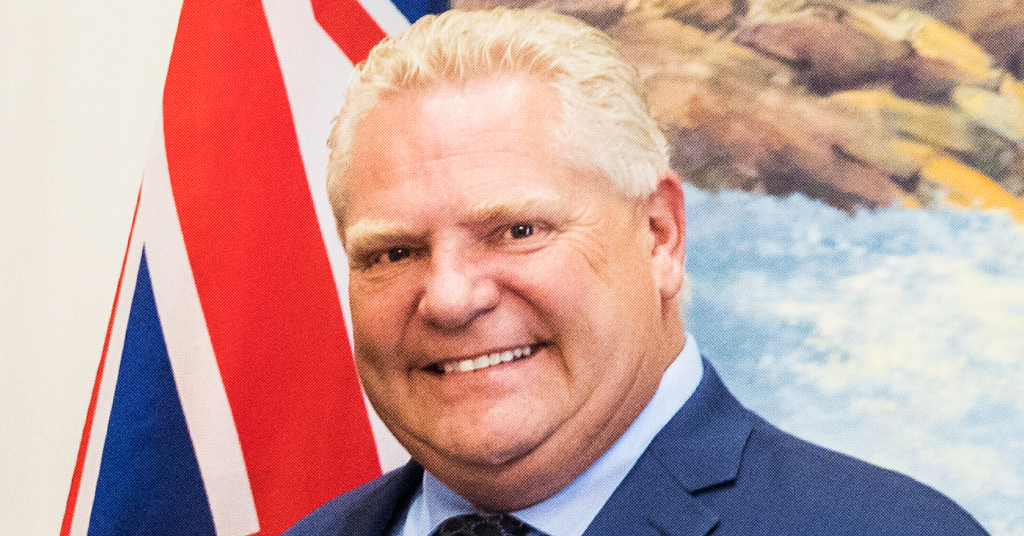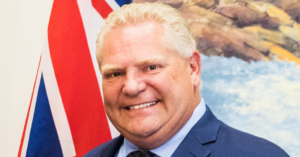
Private Education Company Offers To Let High School Students Pay For Classes Cancelled by Doug Ford
“Private education companies are attempting to capitalize on what they see as an opportunity to profit,” teachers say
A private, for-profit education company is taking advantage of Doug Ford’s cuts to education to sell students classes online that they used to get for free.
After only one budget, the Ford government’s cuts have resulted in hundreds of teacher layoffs, bigger class sizes and fewer elective courses to help students meet university admission requirements.
But Blyth Education, a private, for-profit education company saw an opportunity. Just recently, it launched an advertising campaign to woo students worried about class cancellations risking their futures.
One ad, spotted on Instagram, shows a student holding a sheet of paper listing a “2019/2020 high school schedule” with a number of classes listed as “cancelled.”
“Are you missing electives this semester?” the ad asks. “Don’t fall behind because of cancelled classes!”
The ad notes that the company offers 160 Ontario Secondary School Diploma (OSSD) electives at its private schools.

Other ads the company is running on Facebook tell teenage students they can earn a high school diploma through “online courses.”
“Students in Canada and abroad are able to earn their Ontario Secondary School Diploma (OSSD) completely online through Blyth Academy,” their website notes.
“Our private online courses cover all areas of the curriculum,” their website adds. “Because our online courses are available at any time and from anywhere, you can fit your learning to your life, and not the other way round.”

The Blyth Academy did not immediately respond to a request for comment from PressProgress about the strategy behind its ad campaign.
But Ontario Secondary School Teachers Federation president Harvey Bischof told PressProgress the company’s ads are capitalizing on Ford’s cuts.
“When you take a look at the ads, they are situated perfectly in the environment that Ford has created,” Bischof said.
“It is clear that the Ford policies have created an environment that’s ripe for schools like Blyth academy to promote themselves.”
According to the Blyth Academy’s website, fees for Canadian students cost $495 for Grade 9 courses and $595 for Grade 10 to 12 courses.
Students who can’t afford those fees upfront can use a credit repayment plan through a company called “PayBright.” PayBright’s website indicates that interest rates start at 7.95%, depending on the the client’s credit score. Some plans also include payment processing fees.
Liz Stuart, president of the Ontario English Catholic Teachers’ Association, said its not surprising private companies are trying to profit by filling holes in Ontario’s public education system created by Ford’s cuts.
“Doug Ford’s Conservative government is making reckless cuts that are causing chaos in Ontario’s world-class publicly funded education system,” Stuart told PressProgress, noting his cuts are “increasing class sizes,” “removing vital supports for at-risk students” and “attempting to undermine the professionalism of teachers.”
“Private education companies are attempting to capitalize on what they see as an opportunity to profit.”
Bischof also noted that the Ford government’s requirement that high school students now take four credits of e-learning courses opens up even more avenues for private corporations to take over public education.
“They have not made clear at all who will be delivering this program,” he said.
“There’s a made-to-order opportunity here to outsource the delivery of e-learning to some private institution.”
Earlier this year, after the Ford announced his cuts, PricewaterhouseCoopers began sending e-mails to Ontario guidance councillors offering Tim Hortons gift cards for insider information on how students select courses.
PwC specifically referred to the provincial government’s decision to introduce mandatory online courses.
Our journalism is powered by readers like you.
We’re an award-winning non-profit news organization that covers topics like social and economic inequality, big business and labour, and right-wing extremism.
Help us build so we can bring to light stories that don’t get the attention they deserve from Canada’s big corporate media outlets.
Donate



